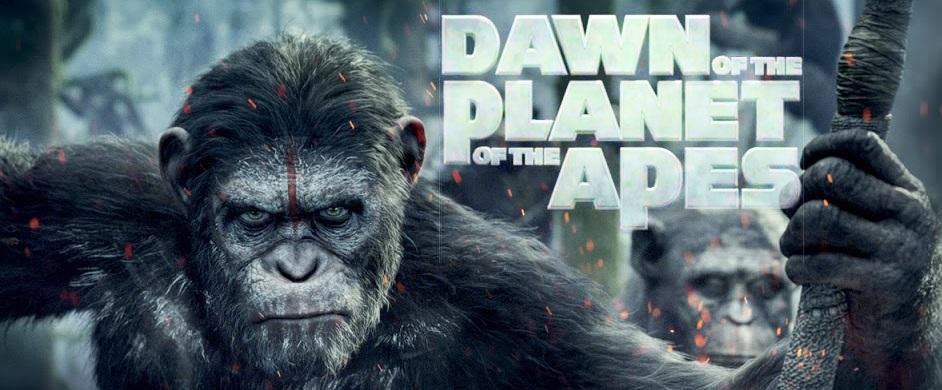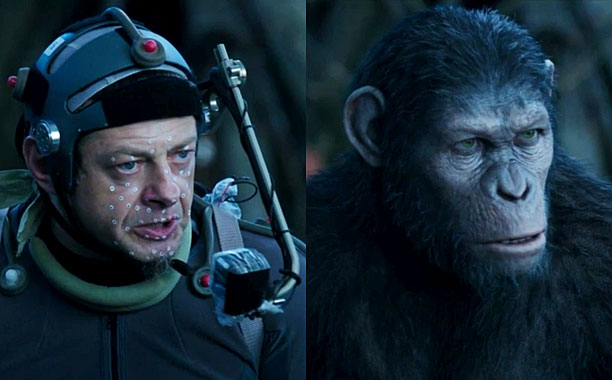August 9, 2014 11:46 am
This Sunday, StarTalk Visits the Planet of the Apes

Credit: ™ and © 2014 Twentieth Century Fox Film Corporation. All rights reserved.
“Take your stinking hands off me you damn dirty ape.”
Turns out that Charlton Heston’s initial impression of apes may have been right.
They commit murder, they’ll mug each other for a piece of fruit, they beat each other to death with sticks, and they organize for aggression and to capture territory.
And that’s on the real planet of the apes, Earth, according to one of this week’s guests, paleoanthropologist and primate expert Dr. Ian Tattersall, Curator Emeritus at the American Museum of Natural History.
Because, as Ian tells host Neil deGrasse Tyson and co-host Eugene Mirman, human being are primates, just like apes. Great apes, in fact – the Family Hominidae. We’re in Subfamily Homininae, and the Tribe Hominini, along with our closest relatives, the common chimpanzee and the bonobo. (Don’t worry, though – we’re in a completely different Genus. We’re Genus Homo, and they’re Genus Pan.)
According to Ian, we share over 99% of our structural DNA with our ape cousins.
It’s that less than 1% that’s at the heart of the rebooted Planet of the Apes movies.
You see, (SPOILER ALERT – stop reading now if you haven’t seen Rise of the Planet of the Apes and you live under a rock and don’t know what it’s about) scientist James Franco injected a chimp named Caesar with an experimental gene therapy drug designed to treat Alzheimer’s Disease, which rewrote his DNA and made him more human.
That’s where our other guest this week comes in.
He’s Andy Serkis, and he plays Caesar, that chimpanzee who evolves into a more human creature right before our eyes over the course of Rise and the latest movie, Dawn of the Planet of the Apes. He begins to express human emotions and use human language.
Unlike Roddy McDowall, who first played Caesar in the 1972 film, Conquest of the Planet of the Apes, Andy isn’t buried inside a costume and under layers of latex that took about 4 hours to put on.
Thanks to Performance Capture Technology, Andy doesn’t have to put on an ape costume at all. He just has to act. And act he does. His performance as Caesar is remarkable, and moving, and powerful, at least in my opinion.

Photo courtesy of Entertainment Weekly.
Andy isn’t just an actor – he’s the founder of The Imaginarium Studios, the premier performance capture studio in the world. He’s played King Kong, but most of the world knows him as Gollum from the immensely popular Lord of the Rings and The Hobbit movie franchises.
Andy tells Neil all about this new technology that is making it possible for any artist to express themselves in any character they want, but perhaps what was most interesting wasn’t the technology.
It was the glimpse we all get into an actor who, despite the utilization of incredibly advanced technology, is very much in touch with the human side of his profession. He’s an actor who has made us sympathize with one of the least sympathetic characters in all of fiction, Gollum, and who has made us see our own humanity in the actions of a chimpanzee.
Which brings us right back to the heart of the Planet of the Apes movies, and what Dr. Tattersall was telling us about primates.
We can learn a lot about ourselves by watching apes.
And some of it isn’t very pretty.
Take a trip with us into the heart of The Planet of the Apes this Sunday, August 10 at 7:00 PM ET on our website, iTunes, Stitcher, TuneIn and SoundCloud.
That’s it for now. Keep Looking Up.
–Jeffrey Simons
Get the most out of StarTalk!
Ad-Free Audio Downloads
Ad-Free Video Episodes
Stickers & Mugs
Live Streams with Neil
Priority Cosmic Queries
Early-Access Videos
Learn the Meaning of Life
...and much more

 Become a Patron
Become a Patron

